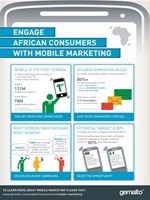If your African mobile marketing plan comprises mass messages not tailored to specific areas, people or times, you're off to a poor start. Nadia Gonzalez, vice president of mobile marketing for Gemalto, reveals the secrets to getting it right.
Mobile's the current industry buzzword, with agencies and clients alike scrambling to come up with mobile campaign best practice, as well as how brands new to the platform can fully embrace mobile marketing. Nadia Gonzalez, vice president of mobile marketing for Gemalto, recently spoke to me of support in monetising, and finding new revenue streams through mobile, especially in Africa.

Nadia Gonzalez, vice president of mobile marketing for Gemalto
For this to be effective, Gonzalez says brands need to engage with mobile network operators and give customers a sense of validation. The best way to do so is to develop a specific channel that can be accessed on any phone. It's even better if it's sim-based, so that a dumb phone user will have the same experience as a smart phone user. By making the process more interactive, it can look like a push communication even to those on a feature phone, making it a one-click solution.
Mobile marketers, put yourself in your consumer's shoes...
To ensure you provide the best message, you need to manage the end-user experience and be cognisant of the pressure mobile consumers face from all fronts, as yours is by no means the only marketing communication they receive. To do so, alter how often you send messages so that you're not too invasive.
Over the past two years, Gonzalez says research surveys have shown you can't say "Just push a channel SMS, the customer's customer is not our problem." It's tricky as you don't want to be seen as a spammer, but mobile network operators often get overly enthusiastic. From Gemalto's point of view, there needs to be greater focus on respect of privacy and security, as well as in knowing the end user, as everything is moving faster and mobile network operators are usually not flexible.
Putting mobile survey results into practice
Gemalto is very focused on technology and has a team immersed in mobile, there to give more insight to customers in terms of how end users evolve. This is crucial as any company with a mobile division needs to be on par with the smaller, more dynamic companies that are completely mobile-centric.

Mobile marketing
In running surveys across world, including Nigeria and South Africa, as they are the fastest growing African countries with a number of mobile network operators operating in each of those companies. Gemalto wanted to understand how far telecommunication companies can go in engaging with customers. The research is based on a focus group, where subscribers chosen by French research firm IFOP were also engaged with face to face and over the phone, to find out whether like the information they receive and whether they're aware of who is sending the messages. There's a slight difference between South Africa and Nigeria, with up to 84% of Nigerian consumers sensitive to advertising in Nigeria and only 73% in South Africa, which may be due to the fact that the South African market is more mature in terms of advertising and as well as regulating consumer privacy.
Added to this, it was found that a huge amount of people simply accept the information on their mobile phones without realising they were subscribing to it and will need to pay for it, which has huge impact on the lower classes, as they're generally a prepaid market so fast run out of airtime. They're ready to receive information as well as advertising, but...
How South African and Nigerian mobile consumers differ
Nigerian consumers are interested in advertising in general but mobile marketing is relatively new in the country. South African consumers, on the other hand, are accustomed to brand communication and eager to be in touch with brands... once they've opted in. 81% of respondents said they are annoyed when they receive messages from senders they haven't given permission to, with Nigeria at a similar 79%.
When it comes to understanding the consumer's concerns and expectations, remember that in Nigeria and South Africa alike, 83% of respondents think the sender must have obtained their permissions first...
While it's slightly higher priority for Nigerian than South African consumers to be able to easily identify the sender (94% to 91%), it's still the utmost priority among both markets to be able to opt-out as well and for the message to be tailored to meet their tastes and concerns.
In knowing your audience, it's important to categorise them into four main types, namely the 'marketing ad immune', who reject ads and never give out their phone numbers; the 'selective ad lovers', who are interested by ads but do not yet see the benefit of receiving them on mobile; the 'control freaks', who are already swamped by ads, so you'll need to tailor messages suited to their profiles to convert them; and the 'connected ad lovers', who actively enjoy promotional messages that they can control the nature and flow of.
Match person, message and moment for the best mobile marketing result

Gemalto mobile marketing infographic
click to enlargeLastly, it's all about reaching the right person with the right message at the right moment. For South Africa and Nigeria respondents alike this would mean offering the mobile consumer an immediate discount or gift from the brand. South Africans are also interested in loyalty programmes and the possibility of collecting points and additional benefits, while Nigerians see more value in receiving regular information about a brand's life.
Putting all of this best practice into play will result in the development of positive relationships with your mobile audience as a result of respecting the customer engagement lifecycle, the base of which is awareness, which results in acquisition, conversion, loyalty, retention and the ultimate end goal of advocacy.
For example, Gonzalez says it's pointless sending out a message about a special on nappies in Cape Town to an untargeted audience, as it'll most likely mean nothing to - and infuriate - the 60-year-old male in Johannesburg who receives it, as it's not relevant to him. Understanding this will drive service investment, but you also need to realise there are technical barriers to overcome. It's best not to send out messages too often, and they're always better received if they're targeted and validated. In order to do so, Gonzalez says not to forget the basics.
It's about putting telecommunications companies and retailers in touch, with aggregators working very fast. Gemalto aims to connect these worlds and make it a win-win, which would entail monetising the subscriber base as well as helping mobile network operators manage the marketing pressure many face by receiving countless messages. It also requires awareness of the fact that the mobile network operator sells his own inventory and the consumer may receive duplicate messages. That's why permission-based marketing is key, as is knowing your customer base and being relevant, in order to meet the ultimate goal of having successful engagements with your customers.
Want to find out more? Click on the 'click to enlarge' link below the infographic, and follow Gemalto on Twitter.




























